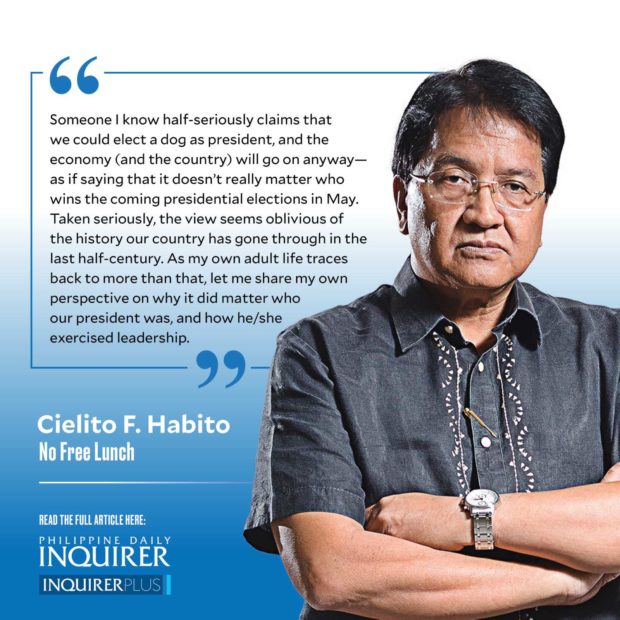The presidency matters
Someone I know half-seriously claims that we could elect a dog as president, and the economy (and the country) will go on anyway — as if saying that it doesn’t really matter who wins the coming presidential elections in May. He’s arguing that it is people and businesses that make the economy and society run, and they will be there no matter what. Taken seriously, the view seems oblivious of the history our country has gone through in the last half-century. As my own adult life traces back to more than that, let me share my own perspective on why it did matter who our president was, and how he/she exercised leadership.
I entered adulthood at about the time Ferdinand Marcos thwarted the constitutional limit to his presidency by declaring martial law to hold on to power, ostensibly “to save the country from the communists.” What ensued was a climate of fear marked by widespread arrests, abductions, and killings of those who dared oppose him, and “disiplina” became the government’s propaganda mantra. But it didn’t take long for greed to manifest at the highest levels, with government policies geared to favor cronies’ businesses, much of it actually his own (which wife Imelda and son Bongbong were to confirm years later). From being second to Japan in average income in the 1960s, we slid down to become the “sick man of Asia,” after Marcos and company had plundered the economy dry by the time the 1986 Edsa People Power Revolution forced them out. Poverty incidence at 55 percent far exceeded that of Malaysia, Indonesia, and Thailand, with 15, 17, and 26 percent respectively. But well beyond damaging the economy, Marcos’ 21-year rule was instrumental to the Filipinos’ “damaged culture” author James Fallows explored in his landmark 1987 article of the same title in The Atlantic—in what could well be the most insidious long-term harm Marcos had inflicted on the country and its people.
Corazon Aquino’s inexperience at governance was refreshing to many who, thanks to her predecessor, had come to believe seasoned politicians to be thieves. But it was also a liability because unable to have her government move as one, her watch was beleaguered by policy gridlocks across branches of the government, even across executive departments. This I witnessed firsthand from inside, as a senior Cabinet official in the last two years of her presidency. Still, she managed to pass critical political, social, and economic reforms, but there could have been much more had she succeeded in eliciting better teamwork in her divided government.
In contrast, Fidel V. Ramos preached “UST”—unity, solidarity, and teamwork—from Day 1 of his presidency. Also from an inside view, this time as member of his Cabinet, I was privileged to witness how he led by example and worked 16-hour days or more, thereby bringing out the best in his appointed and elective officials. Dubbed as the country’s best salesman then, his boundless energy and persistence brought the country back on the map of serious economies to watch in the dynamic Asian region.
While Joseph Estrada chose much of his Cabinet well, his style of leadership negated what could otherwise have been a well-oiled machine. Well-meaning advisers had seen in him the chance to harness his tremendous political capital toward the common good, but in the end, his flawed character brought all those hopes to naught. The renewed hope many initially saw in his ouster was soon to dissipate as Gloria Macapagal-Arroyo’s own acknowledged dishonesty turned her presidency into a constant struggle for political legitimacy, leading to investment stagnation. The promise of honest governance that Benigno S. Aquino III brought led investment to surge and drive sustained economic growth at a level the country had not seen in its modern history.
And then came Rodrigo Duterte, who defies all the rules of presidential conduct, yet paradoxically remains highly popular. His economic managers are his saving grace, and he must be credited for choosing them well. But he has moved the country in dangerous directions, and we need a new president who will arrest all that. Would a dog do just as well? Surely my friend exaggerates.





















